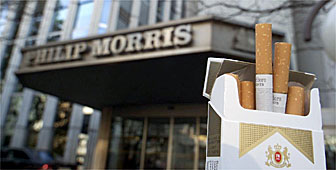
Tobacco-funded research goes up in smoke

A chastened Geneva University has told its staff not to accept funding from tobacco firms, amid allegations that research was misrepresented.
The university vice-rector, Eric Doelker, said it would reconsider the decision only once the tobacco lobby has “changed its attitude”, and stopped interfering in research and misrepresenting its findings.
The decision follows the embarrassing case of a senior researcher at the university who received funding from the tobacco firm, Philip Morris, to conduct – and, some claim, to amend – a study into passive smoking.
The university was prompted to launch an internal investigation into the affair. Based on its findings, it recommends that its staff “no longer accept financing from the tobacco industry”.
But it goes further. The university says it will reinforce controls on all private funding. It is asking all researchers publishing work to declare the provenance of all private funding they received.
Transparency
Doelker says this is in line with the policy of a growing number of scientific journals, which require academics to state their financial links with industry.
“This kind of transparency is necessary for research. I’m sure this will also allow the researcher to keep his independence,” Doelker told swissinfo.
He acknowledges that the affair was embarrassing for his university, but had allowed it to “adapt to a new social situation”.
“This could not have happened 20 years ago. Ethical questions are much more important than they used to be,” he says.
Anti-smoking groups have welcomed the move, describing it as “lucid and courageous”.
“We hope other universities in Switzerland and the rest of Europe will follow this example,” says Pascal Diethelm, head of the local anti-smoking group, OxyGenève.
“It is verging on the unethical for a scientist to accept money from an industry whose product kills people,” he told swissinfo.
Dilemma
Research in higher education is heavily dependent on private funding, and academics are often faced with the dilemma of whether to accept money whatever its source, or to exercise caution when certain ethical boundaries are crossed.
“When you rely on money from the private sector, you have to have a high standard of morality to maintain your credibility,” Diethelm says. The university investigators clearly felt that the scientist in question, Ragnar Rylander, had over-stepped the mark.
The report said no evidence had been found that Rylander, a Swede who had worked in the university’s social and preventive medicine institute for some 25 years, had falsified his findings.
But the investigating team said his methods had not been sufficiently rigorous, and he had “under-estimated the impact on society of his research”. It urged him to publicly distance himself from the “tendentious use made of his research by the tobacco industry”.
Rylander admits receiving funding from the tobacco giant, but stands by his findings.
Defamation trial
That view is contested by OxyGenève and another anti-smoking organisation, CIPRET. It was they who alerted the university to Rylander’s dealings with Philip Morris last March.
These groups accused the Swede of an “unprecedented scientific fraud”. They said his research had been used by the tobacco industry to mislead the public about the dangers of passive smoking.
Rylander responded by suing Diethelm and Jean-Charles Rielle, the head of CIPRET in Geneva, for defamation. The trial is ongoing, but several scientists have testified that Rylander obscured certain data or used questionable methodology.
Rylander’s lawyer says he fears the university is in danger of conducting only “politically correct research”, adding that his client’s only fault has been to fail to fall into line with the majority view.
by Roy Probert

In compliance with the JTI standards
More: SWI swissinfo.ch certified by the Journalism Trust Initiative




























You can find an overview of ongoing debates with our journalists here . Please join us!
If you want to start a conversation about a topic raised in this article or want to report factual errors, email us at english@swissinfo.ch.